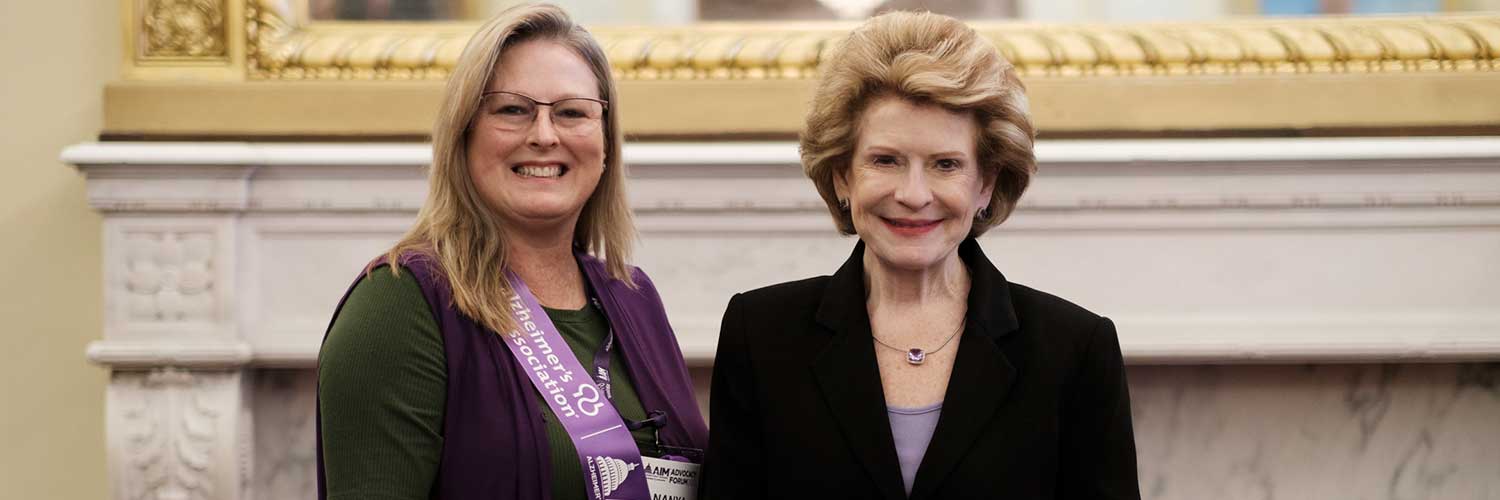Advocates make progress on Capitol Hill
More than 700 advocates turned Capitol Hill purple on May 17 as part of the 2022 Alzheimer’s Impact Movement (AIM) Advocacy Forum, marking advocates’ return to Washington, D.C., after more than two years away due to the pandemic.
Despite the challenges of 2020 and 2021, advocates have made continual progress and celebrated record legislative wins — including the passage of the Improving HOPE for Alzheimer’s Act, the Promoting Alzheimer’s Awareness to Prevent Elder Abuse Act and record increases in federal research funding. This year, advocates raised the bar yet again, with a new slate of legislative asks focused on ensuring that Alzheimer’s and all other dementia remain a national priority.
Nanya Litz of Ann Arbor, Michigan, joined other delegates in a meeting with Sen. Debbie Stabenow (D-Mich.) to urge her to support the NAPA Reauthorization Act and the Alzheimer’s Accountability and Investment Act. The bipartisan bills would extend and build on the momentum of the National Alzheimer’s Project Act (NAPA), which was signed into law in 2011 to ensure that the nation continues to address Alzheimer’s and all other dementia, and the Alzheimer’s Accountability Act, enacted in 2014 to ensure Congress hears directly from scientists on the resources they need to prevent and effectively treat Alzheimer's disease.
Stabenow, a longtime legislative champion for the cause and cosponsor of the original NAPA, agreed to support both new bills.
“We’ve got good momentum, we just need to keep it going,” Stabenow said.
Litz has personally experienced the devastation of Alzheimer’s: Her grandfather and father died of Alzheimer’s, her mother-in-law is living with the disease, and she owns a long-term care community. She is especially passionate about these bills because, among other accomplishments, NAPA and the Alzheimer’s Accountability Act continue to prioritize Alzheimer’s care, support and research.
“I've been personally impacted by this disease for more than 35 years. And that's one reason why I advocate today — because we're still talking about this disease that has no cure and no prevention. That's just not OK to me,” she said.
A delegation from Kansas met with Sen. Jerry Moran (R-Kan.), one of the members of the bipartisan Congressional Task Force on Alzheimer’s Disease who introduced the two new bills this week. Glenda Owens of Garden City lost her father to Alzheimer’s six years ago. Her family struggled to obtain an accurate and timely diagnosis, and then watched helplessly as her father became unable to recognize those he loved and eventually stopped eating.
“I ask, please continue the work NAPA started in 2011 so we can improve care for those with Alzheimer’s,” said Owens, who is concerned about her siblings’ health, and her own, as they near the age her father was when he began showing symptoms. “Never do I want to see another person [go through this].”
Pat Risher of Middletown, Delaware, met with legislative aides for Rep. Lisa Blunt-Rochester (D-Del.), who introduced the bipartisan Equity in Neuroscience and Alzheimer’s Clinical Trials (ENACT) Act. The ENACT Act would increase the participation of underrepresented populations in Alzheimer’s and other dementia clinical trials by expanding education and outreach, encouraging the diversity of clinical trial staff and reducing participation burden.
“[The ENACT Act] would mean that Black Americans like me and my mother would be included in clinical trials. Even though we are the same in terms of human beings, we all are different in our DNA. We need to learn more about our risk so that we can counteract or at least address it,” she said.
Risher’s mother lived with Alzheimer’s for over a decade before dying of COVID-19. Risher says her mother, who was a nurse, worked for more than 25 years at a nursing home in Philadelphia and cared for many Black residents living with dementia. Black Americans are about twice as likely as White Americans to have Alzheimer’s or another dementia, but research is limited around why their risk is higher.
Although Risher has been involved with the Alzheimer’s Association for years, this was her first time attending the AIM Advocacy Forum.
“I see the advocacy in motion where people are actually making a difference, putting it on paper, not only talking about the problem but doing something about the problem,” she said.
Back to top
Back to Highlights

Join the conversation #ENDALZ #alzforum